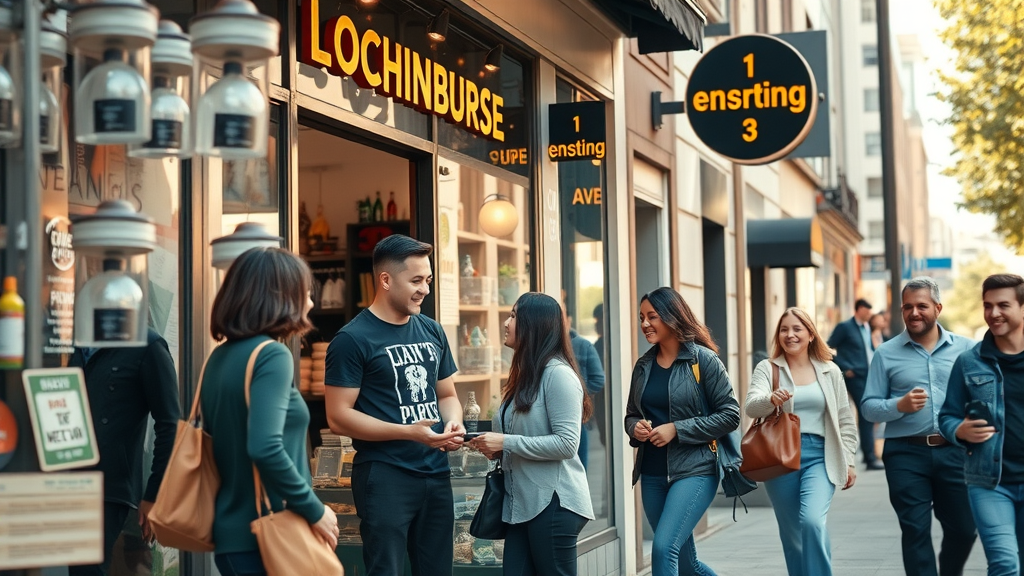Did you know that local businesses using digital marketing grow 40% faster than those relying solely on traditional methods? In today’s hyper-connected world, local businesses cannot afford to ignore the digital revolution. This article uncovers the powerful secrets behind successful digital marketing for local businesses, revealing practical strategies, real-world transformations, and expert insights to help your business win big in your market.
Unlocking Business Growth: Why Digital Marketing for Local Businesses Matters Now
Digital marketing for local businesses is more than just a trend—it's a necessity for sustainable growth. With more consumers searching for products and services online than ever before, small businesses must compete not only with local competitors but also large national brands. By harnessing effective digital marketing strategies, local business owners can reach their target audience through search engines, social media platforms, and local SEO, ensuring their business appears at the top of local search results.
Take, for example, a small bakery that starts an Instagram campaign and optimizes its Google Business Profile. The result? An influx of new local customers who found them through digital channels. This is just one of many practical examples of how digital marketing can transform your reach, increase your customer base, and establish your business pro reputation within your community. With digital marketing, local businesses not only keep up—they stand out.

A Surprising Statistic: Local Businesses That Use Digital Marketing Grow 40% Faster
According to recent studies, local businesses implementing digital marketing grow nearly 40% faster than peers who limit themselves to traditional methods. This rapid growth is driven by online visibility, expanded reach, and enhanced engagement through digital marketing strategies such as content marketing, search engine optimization (SEO), and social media marketing. Local SEO and an optimized online presence can put your business on the map—literally and figuratively—helping you connect with potential customers nearby and drive more foot traffic to your storefront.
Embracing digital marketing isn't just about staying competitive; it's about seizing new opportunities to serve your customer base better, boost loyalty, and generate consistently higher revenue. The businesses that invest in local digital marketing strategies now are often the ones cited for innovative, community-focused growth tomorrow.
Breaking the Myths: Challenges and Opportunities in Digital Marketing for Local Businesses
A persistent myth is that digital marketing is too technical, expensive, or time-consuming for small businesses. However, many local business owners are finding that tools for local search, social media platforms, and content marketing are more accessible than ever—with low entry barriers and user-friendly interfaces. While challenges like maintaining NAP (Name, Address, Phone number) consistency across your local listing profiles and managing online reviews exist, they are easily surmountable with a focused strategy.
The reality? Digital marketing levels the playing field, enabling even the smallest local businesses to achieve visibility and credibility online. It’s about learning how to optimize your business profile, leverage affordable marketing strategies, and connect with your target audience. The result is genuine growth and new avenues to serve your community, boost your brand, and create a loyal customer base.
What You'll Discover About Digital Marketing for Local Businesses
- The core components of a successful digital marketing strategy for local businesses
- How to build an online presence that attracts your target audience
- Practical steps for implementing social media, email marketing, and SEO
- How to optimize your business profile and local listings
- Real-world marketing strategies for increasing customer engagement
Understanding Digital Marketing for Local Businesses: Core Concepts and Trends
Digital Marketing vs. Traditional Marketing for Small Business
Digital marketing for local businesses offers reach and targeting capabilities traditional marketing simply cannot match. Traditional marketing, such as print ads or flyers, has a broad but unfocused approach. In contrast, digital marketing strategies like search engine optimization, targeted social media ads, and email marketing allow you to reach specific demographics, interests, and geographic areas—drastically improving campaign efficiency and return on investment.
With the ability to track and measure every customer interaction online, small businesses now have the data to refine their messaging in real-time, minimizing wasted spend compared to costly traditional campaigns. Whether you are focusing on your business profile or optimizing for local search, digital marketing gives local business owners unparalleled flexibility and scalability.

Latest Digital Marketing Trends Impacting Local Businesses
The shift to mobile-first browsing, voice search, and algorithm-driven platforms is profoundly impacting digital marketing for local businesses. New trends, such as hyperlocal targeting—using GPS and behavioral data to reach the most relevant customers—are helping local businesses get in front of people when and where it matters most.
Another game-changer is the growing influence of customer reviews and real-time social media engagement. With platforms like Google My Business, Facebook, and Instagram, local businesses can now interact directly with their target audience, showcase their products and services, and build trust quickly. Smart local businesses are embracing these digital marketing developments to stand out in crowded markets and foster loyalty.
Establishing a Solid Online Presence for Your Local Business
Crafting a Professional Business Profile That Converts
Creating a compelling business profile online is the foundation for local SEO and digital success. Your business profile should clearly communicate your value proposition, highlight unique offerings, and include strategically placed keywords relevant to your local audience. Consistency is key—ensure your name, address, phone number, and operating hours match across your website, Google Business Profile, and other local listings.
Adding high-quality images, responding to customer reviews, and regularly updating your business profile information signals credibility to both search engines and potential customers. Make it easy for users to find and trust your local business by presenting a polished, inviting profile on every platform where your brand appears.

Designing a User-Friendly Website for Small Businesses
Your website is your digital storefront—and first impressions count. For local businesses, a clean, mobile-friendly site that clearly displays products and services, business hours, and contact information is a must. Prioritize fast load times, intuitive navigation, and clear calls to action. Local SEO elements such as embedded maps, reviews, and schema markup help improve your search engine rankings and ensure your business appears in local search results.
Additionally, integrating online booking, chatbots, and FAQ sections can simplify the user journey and boost conversions. Think of your website as an always-on sales tool—investing in usability, accessibility, and compelling visual branding creates a positive online presence that keeps potential customers coming back.
Identifying Your Target Audience to Maximize Digital Marketing Results
Audience Research Techniques for Local Businesses
Understanding your target audience is critical for effective digital marketing for local businesses. Start by analyzing data from your existing customer base—collect demographic information, purchasing patterns, and feedback to develop a clear picture of who visits and buys from your business. Use social media insights, Google Analytics, and customer surveys to dig deeper into interests and preferences.
Look for patterns: What problems do your customers need solved? What other products and services are they seeking? This level of research helps you tailor marketing strategies—content marketing, local SEO, and social media campaigns—to reach the right potential customers at the right time.

Building Customer Personas for Small Business Success
Customer personas are fictional representations of your ideal local customer . Building these personas involves combining research data with insights about their behaviors, needs, and pain points. Detailing their goals, challenges, lifestyle, and preferred digital platforms allows you to craft more precise messaging and creative campaigns that resonate and convert.
For small businesses, even two or three well-developed personas can guide decisions about which social media platforms to prioritize, what types of content marketing to create, and how to design your website for maximum impact. The key is to keep personas updated as your customer base evolves, ensuring your digital marketing strategies always hit the mark.
Marketing Strategies that Work: Proven Digital Marketing Tactics for Local Business
Content Marketing for Local Business: Content That Drives Traffic and Sales
Effective content marketing is at the heart of digital marketing for local businesses. By creating blog posts, local guides, video tutorials, and social media updates, you attract and engage both new and repeat customers. Topics might include community news, how-to articles relevant to your products and services, and customer success stories. Content that incorporates local SEO strategies—like using neighborhood names and frequently searched terms—helps you rank higher in local search.
- Content ideas for local SEO and engagement
- Storytelling as a small business branding tool
Harnessing storytelling humanizes your brand, turning your small business into a relatable community member. Share your journey, highlight employee stories, or feature local partnerships to foster authenticity and trust. Consistent, valuable content builds credibility, establishes expertise, and drives more potential customers to your digital doorstep.
Search Engine Optimization (SEO) for Local Businesses: Getting Found on Google
For local businesses, search engine optimization (SEO) is the most effective way to increase visibility and attract ready-to-buy customers. Start with on-page SEO fundamentals: optimize your website titles, meta descriptions, and content with relevant keywords for your area. Ensure your contact information is current and consistent across all local listings—this is fundamental for local SEO and Google’s local search algorithm.
- On-page SEO basics for small businesses
- Local SEO strategies to dominate local search
To dominate local search , go beyond the basics by building local citations, encouraging customer reviews, and leveraging schema markup tailored to your industry. The payoff? Better placement in search results, more website traffic, and increased foot traffic to your brick-and-mortar location.
| Criteria | SEO | Traditional Advertising |
|---|---|---|
| Cost | Lower ongoing cost (after initial setup) | Ongoing high costs (print, radio, direct mail) |
| Targeting Precision | High (based on local search intent and keywords) | Low (broad, less focused) |
| Measurability | Real-time analytics and tracking | Challenging to measure direct ROI |
| Longevity of Results | Sustained results with maintenance | Short-lived, stops when spending does |
Effective Social Media Platforms and Strategies for Local Business Growth
Choosing the right social media platforms is essential for maximizing your reach and engagement. Platforms like Facebook, Instagram, and Nextdoor are ideal for local businesses seeking to engage their customer base . Use visually compelling posts, live video, and targeted social media ads to showcase your products and services, announce special promotions, or highlight community involvement.
- Top social media platforms for local businesses
- Platform-specific tactics for local engagement
Platform-specific tactics include using Facebook Events to boost local event attendance, Instagram Stories for behind-the-scenes content, or LinkedIn for B2B networking. For the best results, focus on channels where your target audience spends the most time and adapt your content for each platform’s strengths.

| Platform | Best Use Case | Target Audience |
|---|---|---|
| Local community building, events, ads | Adults 25-65+, families, professionals | |
| Visual branding, stories, influencer collaborations | Young adults, creatives, shoppers | |
| Nextdoor | Neighborhood updates, direct local outreach | Homeowners, parents, community members |
| B2B connections, recruitment, networking | Professionals, business owners |
Social Media Marketing vs. Media Marketing: What Works for Small Businesses
While traditional media marketing like print or radio ads can boost initial brand awareness, social media marketing delivers ongoing, two-way engagement and better ROI for local businesses. Social platforms empower small business owners to interact in real time, address questions, and nurture brand loyalty at a personal level.
Additionally, digital media marketing's advanced targeting options ensure ad spend reaches more likely buyers. Through user-generated content, interactions, and reviews, social media marketing builds trust—one conversation at a time—making it indispensable for today’s savvy local business pro.
Optimizing Your Local Listing and Building a Strong Local Business Profile
How to Claim and Optimize Your Google Business Profile
Claiming and optimizing your Google Business Profile is one of the quickest ways to boost online visibility for local businesses. Start by ensuring that your business profile is complete and accurate—update your business name, address, phone number , hours, and category. These details must be consistent across all digital platforms and local listings to maximize your local SEO effectiveness.
- Best practices for NAP (Name, Address, Phone number) consistency

Include high-quality photos, reply to reviews, post updates, and use rich keywords related to your products and services to enhance your business profile. Frequent optimization signals to search engines that your business is legitimate and active, improving chances to appear in local search and Google Maps.
Strategies for Managing Reviews and Boosting Your Local Reputation
“Customers trust online reviews as much as personal recommendations.” – Industry Expert
Your local reputation is largely shaped by what customers share online. Invite satisfied customers to leave positive reviews, respond promptly to feedback (both positive and negative), and address concerns professionally. This transparent communication builds trust and can even turn unhappy experiences into loyalty-building opportunities.
Regularly monitoring and managing your online reviews isn’t just about customer service; it’s essential to local SEO and earning a top spot in search results for your niche. By having a proactive review management strategy, you'll improve your online presence and stand out from competing local businesses.
Harnessing Email Marketing to Engage and Retain Your Target Audience
- Email campaign ideas for small businesses
- Segmenting your subscribers for maximum impact

Measuring Email Marketing Success for Your Small Business
Tracking the results of your email marketing campaigns enables you to fine-tune your strategies for better engagement and conversions. Key metrics to monitor include open rates, click-through rates, and conversion rates. Use A/B testing to refine subject lines, message content, and offers. Segment your list by customer type, purchase history, or location to ensure that your email marketing speaks directly to each audience segment’s needs.
Regular analysis helps you deliver the right offers at the right time, improving customer retention and CLV (customer lifetime value). By making data-driven decisions, small business owners achieve better results from their digital marketing efforts and build a loyal local following.
Boosting Results with Integrated Digital Marketing Strategies
Integrating Content, Social Media, and Email Marketing for Local Business Success
The most successful local businesses use integrated digital marketing strategies that combine content marketing, social media, and email marketing. For example, an informative blog post can be promoted on Facebook, expanded upon in an email newsletter, and referenced in local SEO efforts—all reinforcing the same message. This integration strengthens your online presence and keeps your brand top-of-mind with your customer base.
Unified messaging across platforms creates a seamless experience for potential customers, whether they discover you through a social media post, a Google search, or an email. These cross-channel strategies maximize every touchpoint, increasing the chances of engagement and conversion.

Tracking Success: Key Metrics for Digital Marketing for Local Businesses
Vigilantly tracking metrics is vital for digital marketing success. Monitor website visits, click-through rates, local SEO rankings, review counts, and social media engagement. Tools like Google Analytics and Facebook Insights provide in-depth visibility into campaign performance, letting you optimize resources and achieve better ROI.
| Metric | Purpose |
|---|---|
| Website Traffic | Tracks visitor volume and identifies peak periods |
| Conversion Rate | Measures percentage of website visitors who take a desired action |
| Local Search Rankings | Monitors position in Google Maps/local pack for key searches |
| Review Scores | Reflects customer satisfaction and brand reputation |
| Email Campaign Engagement | Assesses open, click, and unsubscribe rates |
| Social Engagement | Monitors likes, shares, and comments to gauge brand buzz |
Expert Marketing Strategies for Small Businesses: Advanced Tips for Local Success
Leveraging Paid Advertising for Local Businesses
Expanding your reach quickly? Paid digital ads—like Google Ads (PPC), Facebook Ads, and Instagram promotions—allow local businesses to target specific zip codes, demographics, and behaviors. Small businesses can set modest budgets, test headlines and images, and measure which ads drive actual leads or in-store visits.

Retargeting advertisements are another powerful tool: they serve reminders to past website visitors, keeping your business top-of-mind until they are ready to buy. With paid advertising, even the smallest local business can achieve outsized results, driving traffic, calls, and walk-ins from their ideal target audience.
Partnering with Other Local Businesses for Mutual Growth
Collaboration is a powerful marketing strategy for local businesses. Consider co-hosting community events, running cross-promotions, or sharing resources with complementary businesses—like a coffee shop teaming up with a bakery. These partnerships expand your reach to new potential customers, boost visibility, and create a sense of community involvement.
Shared audiences through local search, social media, and email marketing campaigns yield win-win results, enhancing reputation and customer trust for all partners involved. Strategic alliances demonstrate your commitment to local growth and position your business as a valued member of the community.
Common Pitfalls in Digital Marketing for Local Businesses and How to Avoid Them
- Frequent mistakes in local SEO
- Social media missteps and how to correct them
Even the best local businesses can stumble in digital marketing. Common local SEO errors include inconsistent Name, Address, and Phone number entries, neglecting customer reviews, and failing to update business profile details. Meanwhile, on social media, sporadic posting, lack of engagement, and over-promotional content often diminish returns. The solution? Regular audits, prompt review responses, tracking analytics, and evolving your approach based on customer feedback and industry trends.
Success Stories: Digital Marketing Transformations for Local Businesses
“Implementing digital marketing changed the trajectory of our business.” – Local Business Owner
Success stories abound for savvy local businesses embracing digital marketing strategies. From neighborhood auto shops gaining new loyal customers through local SEO, to boutique stores seeing traffic triple with the help of social media marketing, digital transformation can rapidly accelerate business results. Tangible improvements in sales, customer base expansion, and stronger community reputation follow these targeted efforts.
For example, a local gym saw signups soar by creating instructional workout videos and optimizing their Google Business Profile—a testament to what focused online marketing can achieve for small businesses determined to thrive in a digital-first world.
Video: Digital Marketing for Local Businesses – Watch and Learn
Video: Top 5 Digital Marketing Strategies Every Local Business Needs
Frequently Asked Questions on Digital Marketing for Local Businesses
Do small local businesses need digital marketing?
Absolutely. Even the smallest local businesses benefit tremendously from digital marketing by reaching more targeted, ready-to-buy customers, increasing brand awareness, and staying competitive in the digital age.
How to do digital marketing for a small business?
Start by building a strong online presence (website, Google Business Profile), define your target audience, utilize SEO, engage audiences on the right social media platforms, run targeted email campaigns, and monitor your marketing strategies for ongoing improvements.
What are the 4 types of digital marketing?
The primary types include Search Engine Optimization (SEO), Content Marketing, Social Media Marketing, and Email Marketing—all essential for local business growth.
Is digital marketing worth it for small businesses?
Absolutely. Digital marketing provides cost-effective ways for small businesses to reach new customers, track results, and compete with larger companies – maximizing their return on investment.
Video: Case Study – Local Business Success with Digital Marketing
Key Action Steps for Digital Marketing for Local Businesses
- Audit your current online presence and local listing profiles
- Define and understand your ideal target audience
- Develop a clear local digital marketing strategy
- Optimize for local SEO and manage online reviews actively
- Create and curate valuable content to engage your community
- Leverage social media and email marketing platforms
- Regularly monitor performance and adapt your marketing strategies
Future Trends and Innovations in Digital Marketing for Local Businesses
The Rise of AI and Automation for Local Small Businesses

Artificial intelligence (AI) and automation are revolutionizing digital marketing for local businesses. Tools like automated social media scheduling, chatbot support, and AI-powered analytics reduce manual workload and help small business owners deliver personalized service at scale. These innovations enable data-driven decisions and more effective outreach to a wider target audience.
Hyperlocal Targeting: Using Data to Reach Your Perfect Customer

Hyperlocal targeting uses sophisticated data analysis to deliver marketing messages to potential customers within very specific geographic areas—sometimes just a neighborhood or block. By combining behavioral and location data, local businesses can connect with the right customers at the right moment, improving the ROI of every digital marketing campaign.
“Personalization and automation will define successful local business marketing over the next decade.” – Digital Marketing Pro
Summary and Final Thoughts on Digital Marketing for Local Businesses
- Consistent digital marketing is essential for local business growth
- Start small, track your results, and keep learning
- Stay flexible and responsive to market changes
Turn Your Local Business Vision into Results with Digital Marketing
Ready to turn your vision into results? Book your free strategy session today.
Take action now: Audit your online presence, define your target audience, and start implementing local digital marketing strategies to unlock new growth opportunities!
 Add Row
Add Row  Add
Add 



Write A Comment